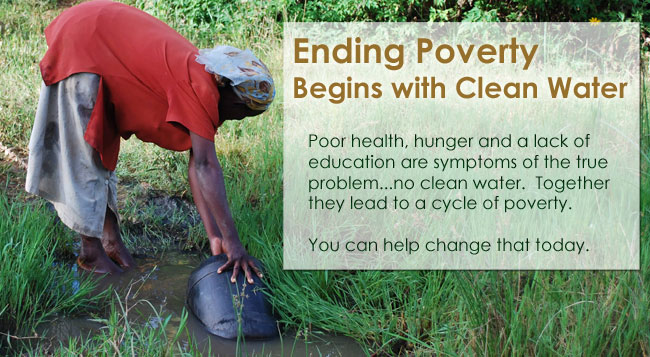
Poverty in Ghana Begins With a Lack of Clean Water
Poverty and Water are Related
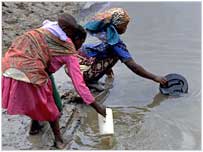
There are a number of reasons why poverty has become an epidemic in Ghana. Poverty can be the result of political instability, ethnic conflicts, climate change and other man-made causes.
But one of the greatest causes of poverty in Ghana is also the most overlooked...the lack of access to clean drinking water.
Nearly ten million people do not have access to clean, safe water. For these people, poverty is a fact of life. The good news is that this is a solvable problem.
|
Access to clean water
The foundation of all development
The lack of water is an often insurmountable obstacle to helping oneself. You can't grow food, you can't build housing, you can't stay healthy, you can't stay in school and you can't keep working.
Without clean water, the possibility of breaking out of the cycle of poverty is incredibly slim.
With unclean water sources often miles from villages, many of the able bodied members of a community are forced to spend hours each day simply finding and transporting water. The typical container used for water collection in Ghana, the jerry can, weighs over 40 pounds when it's completely full.
Imagine how demanding it would be to carry the equivalent of a 5-year old child for three hours every day. And some women carry even more, up to 70 pounds in a barrel carried on the back. That's like carrying a baby hippo.
Wasted Time
The United Nations estimates that Sub-Saharan Africa alone loses 40 billion hours per year collecting water; that's the same as a whole year's worth of labor by France's entire workforce! This is incredibly valuable time.
With much of one's day already consumed by meeting basic needs, there isn't time for much else. The hours lost to gathering water are often the difference between time to do a trade and earn a living and not. Just think of all the things you would miss if you had to take three hours out each day to get water.
When a water solution is put into place, sustainable agriculture is possible. Children get back to school instead of collecting dirty water all day, or being sick from waterborne illnesses. Parents find more time to care for their families, expand minimal farming to sustainable levels, and even run small businesses.
The social and economic effects caused by a lack of clean water are often the highest priorities of Ghanan communities when they speak of their own development. The World Health Organization has shown this in economic terms: for every $1 invested in water and sanitation, there is an economic return of between $3 and $34! |
How we're helping
...And how you can join us
For often less than an average of $23 per person, The Water Project is able to work with local partners to provide closer access to clean water. Our goal is to bring clean, sustainable water supplies to within a 1km (1/2 mile) of a village. By doing so, communities can be freed to begin working themselves out of poverty.
When you give to help build a well, you'll make sustainable agriculture possible. You will allow children to get back to school instead of collecting dirty water all day.
You'll help father's find more time to care for their family, maintain a farm, and even run a small business.
You can help break the cycle of poverty in Ghana.
How can you help?
Why Water Matters
When water comes, everything changes... |
A Good Education
...begins with access to safe water and proper sanitation
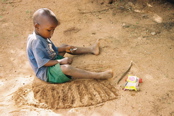 Education is critical for breaking the cycle of poverty and yet over half of the world's schools lack access to safe water and sanitation facilities. Education is critical for breaking the cycle of poverty and yet over half of the world's schools lack access to safe water and sanitation facilities.
Lack of clean water has serious effects on student's academic performance and attendance rates. The lack of safe water can cause even the best students to lose momentum as they deal with stomach pains and diarrhoea from disease and hunger.
Students miss class to go fetch water, or to care for sick parents or siblings. In many places HIV/AIDS has already caused a large percentage of children to become orphans, requiring students to drop out and find work to provide food and care for younger siblings. If teachers are sick, classes get cancelled for all students.
Schools cannot run programs if they cannot provide water to students, faculty and their families.
Lack of Water = Lack of Equality
For girls, the situation is especially troublesome. If schools do not have proper toilets, girls drop out once they reach puberty. Further, it is typically the responsibility of the women to fetch water thus limiting their access to both education and business opportunities. Think about it: everyday, women and young girls carry more than 40 pounds of dirty water from sources over 4 miles away from their homes. This leaves little time for education which is critical to changing the long term prospects of developing nations.
With the many additional burdens that a lack of clean water brings, education simply becomes less of a priority. This sets up an unfortunate cycle of poverty and inequality as without a proper education, there is little chance of improving one's situation later in life. The Water Project is working to break this cycle. Sometimes the first public voice the women of a community ever have, comes from an individual woman who is part of a water committee. |
Join in and help
Get your school or small group involved
For around $23 per student, The Water Project is able to work with local well drillers to build wells at schools and other central locations so kids can stay in school and women can gain a voice in their community. Our goal is to bring clean, sustainable water supplies to within a half mile (1 km) of a village. By making the process of collecting water more time-efficient, we're giving children (especially girls) a chance to get back in to the classroom to break the cycle of poverty for themselves. You can be a part of the solution to end the gender gap in classrooms across the developing world and help children stay in school. |
Improving Health in Ghana
...begins with access to safe Water
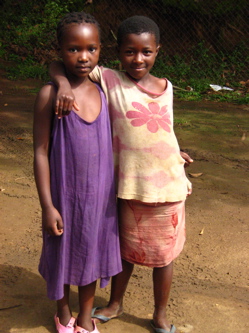 Good health begins with access to clean water. Good health begins with access to clean water.
Did you know that half of the world's hospital beds are filled with people suffering from a water related disease? In developing countries, about 80% of illnesses are linked to poor water and sanitation conditions. 1 out of every 5 deaths under the age of 5 worldwide is due to a water-related disease. Clean and safe water is essential to healthy living.
Tiny worms and bacteria live in water naturally. Most of the bacteria are pretty harmless. But some of them can cause devastating disease in humans. And since they can't be seen, they can't be avoided. Every glass of dirty water is a potential killer.
Most of these waterborne diseases aren't found in developed countries because of the sophisticated water systems that filter and chlorinate water to eliminate all disease carrying organisims. But typhoid fever, cholera and many other diseases still run rampant in the developing parts of the world.
Water and Young Children
Infants and young children are especially susceptible to diseases because their immune systems are experiencing everything for the first time. Even in developed countries, lots of moms boil water before giving it to their children - just to be doubly safe. In poor countries, the fuel for the fire can be so expensive that mothers can't afford to boil water and cook food.
Poor health leads to poor productivity.
The sickness caused by dirty water saps people's energy to do much of anything. If you've ever had food poisoning, you know how horrible it can be. Students who suffer from water borne illness can't stay in class. They miss out on the chance to learn and the cycle of poverty continues. That and when one person is sick, someone else has to take care of them, which means that the second person can't work either. If the sick person needs medicine, that money can't be used for other things, like food or school supplies.
Rural dwellers and the urban poor feel the lack of safe water and proper sanitation in the developing world the most. With few medical resources at their disposal, the poor are particularly vulnerable to chronic illnesses that hinder their productivity, making the escape from poverty even more difficult. |
Help. Give Water and Improve Health.
Every gift makes a huge impact.
For often less than $23 per person, The Water Project is able to work with local partners to provide access to clean water as well as hygiene and sanitation programs. These training programs greatly reduce the disease burden in their communities, allowing villagers to increase their productivity and begin working themselves out of poverty. You can be a part of the solution to reduce disease among the world’s poorest communities. |
Water and Hunger
Improving Sustainability in Rural Ghana
The water cost of food
Consider the following foods we take for granted...
Food |
Water Needed
to Produce
(in litres) |
1 Glass of milk |
200 |
Cup of Coffee |
140 |
Bag of Chips |
185 |
Slice of Bread |
40 |
Egg |
135 |
Apple |
70 |
Hamburger |
2,400 !! |
Relieving hunger in Ghana has to begin with access to clean water. It may seem simple, but we forget that without access to a reliable source of water, food is hard to grow and even more difficult to preserve and prepare.
It takes huge amounts of water to grow food. Just think, globally we use 70% of our water sources for agriculture and irrigation, and only 10% on domestic uses.
Water is fundamental to relieving hunger in the developing world. 84% of people who don't have access to improved water, also live in rural areas, where they live principally through subsistence agriculture. Sometimes, areas that experience a lack of water suffer because of poor water management, but more often it is a relatively simple economic issue that can be addressed. This is the difference between physical and economic scarcity.
The Rural-Urban divide
In Sub-Saharan Ghana, people in urban areas areas are twice as likely as people in rural areas to have clean, safe water. Another way that we see the urban-rural divide is in sanitation. While rural areas often have less access to sanitation facilities, in Sub-Saharan Ghana the situation is very poor. Only 24% of the rural population, and 44% of the urban population have access to sanitation facilities. This means that less than one in three people in Sub-Saharan Ghana have access to a proper toilet.
There is hope
A small investment in a clean, safe source of water can have a huge impact on both crop production and the nutrition of a community. In fact, one of the most encouraging things we find when we return to sites where wells have been installed is the many small gardens that have popped up all around.
When we ask communities what improvements they've seen as a result of clean water, many send us pictures of their crops - proud of the progress they've made.
Sometimes the technologies we fund specifically target increased crop production. For example, we fund weirs (sub-surface sand dams) in very dry places where seasonal water flows can be captured and stored. The dams trap rain water on the few rainy days of the year and over time, ground water levels rise.
People can then collect or store the water for drinking. The leftover water seeps into the ground and creates more fertile fields. Simple sustainable irrigation in these dry areas becomes possible. You will see how such a project really can make a difference. |
Help Relieve Hunger and Thirst
Join the effort today
For often less than $23 per person, The Water Project is able to work with local partners to ensure the right solution is used in the right place. Our goal is to bring clean, sustainable water supplies to within a half mile (1 km) of a village. By utilizing technologies like weirs and wells, we will be improving sustainability in communities so they are able to begin working themselves out of poverty.
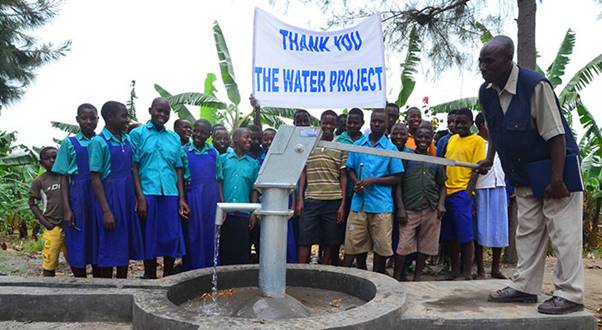
|
Sponsor A Water Project in Ghana
Make an enormous impact on hundreds of lives by sponsoring a clean water project in Ghana
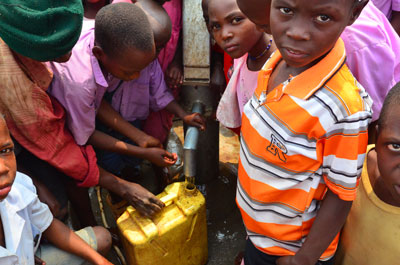
You, your school, church or even a group of your friends can choose to fund an entire clean water project in Ghana.
Cost and project availability vary, but on average a village sized water project can be completed for between $7,000-$10,000. The costs include preparing the community for a water project, actual construction and the long-term monitoring and evaluation needed to make sure your investment lasts a very long time.
All it takes is a bit of passion and a little time to change someone's world. |
Common Questions about
Funding a Well / Water Project
Our goal is to provide you with the information you need to confidently partner with us in funding a well project. We also want to help you host a hugely successful fundraiser.
If you can't find the information you need below, or you'd just like to chat, please don't hesitate to call us at +233 242-961-804 for responses to the following questions:
Where will the project be built?
How can you be sure it was built?
Can you go to Ghana to help build the water project?
How to get started?
If you are interested in sponsoring an entire well, or even just a portion, we've got a couple great tools to help get your project off the ground...
|
Dig a well project
Building a well for communities that don’t have access to clean and safe drinking water can be life changing.
Water is a source of life, yet over 1/6th of the world’s population lack access to safe drinking water. A further 2.5 billion, including 1 billion children, live without basic sanitation. We’re working towards the UN Millennium Development Goals to halve the number of people in the world without access to safe drinking water and basic sanitation by 2015. |
|

 Education is critical for breaking the cycle of poverty and yet over half of the world's schools lack access to safe water and sanitation facilities.
Education is critical for breaking the cycle of poverty and yet over half of the world's schools lack access to safe water and sanitation facilities.



